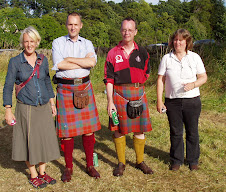Neither the cleaner nor the personal trainer turned up
today. I must have had the day wrong. There is an Italian lesson tomorrow, however.
I think I’ve done enough homework to allow an early bed.
As for knitting, I turned out to have plenty of long circulars in the
required gauge. I have left the live stitches of the centre of the Spring Shawl where they were, adding secure
point protectors. And I have slid another needle through the YO’s at the
beginning of every row. Easy-peasy, and equivalent, of course, to picking up a
stitch every other row, as the pattern commands.
I thought I acquired this technique from Gudrun Johnston’s
hap “Lang Ayre” in Kate Davies’ Hap book. Not so, I see, looking it up, although she employs it there – I’ve
never knit that one (although it’s very tempting). She must have used it in her
Craftsy hap class. A YO at the beginning of a row is not quite as easy as it
sounds, but one gets the hang of it. And not having to struggle with the stitch
count at the end is bliss. I counted, of course, but it wasn't a struggle.
The result, needless to say, is a row of little holes along the
pick-up line. No harm in that.
Reading
I’ve finished Memento Mori (and started Phineas Redux – I like
it much better than the Eustace Diamonds, so far).
When I read it long ago, I got bogged down in the characters
and their long-ago love affairs and their inheritances. I decided that the
point was that all that really matters is the Four Last Things: Death,
Judgment, Hell and Heaven. The final paragraph leaves Jean Taylor pondering
those things.
This time the relationships seemed perfectly clear, and the
money worth having, although the point remained the same.
I was disconcerted to find that I am older than almost all
the principal characters.
One very small niggle: I remembered, from all those years
ago, the wonderful scene where Charmian makes herself tea, and carries it
through to the fire, item by item. At one point she drops some biscuits, but
retrieves them, along with the crumbs. At another, she spills something on the
kitchen floor, and cleans that up, too.



As usual, I now feel the need to read "Memento Mori". I remember Diana Athill describing a gardening group in her care home where three of the four were beyond kneeling, knowing that they would not be able to get back up if they did so. And yet they managed to plant some roses.
ReplyDeleteSeveral years ago there was an exhibit here of Matisse's collages, with images of him doing some of the work "painting with scissors" in a wheelchair. Seems like a confluence of what's been discussed here in the past few days. Now I really must re-read Memento Mori, and a later Diana Althill!
ReplyDeleteRegarding your picked-up yarnovers and the resulting holes: you could work the stitches of the first round through the back loop and it should close up nicely.
ReplyDeleteOr enjoy the border of little holes😊
I love that shawl, can’t wait to see it completed!
I appreciate your blog so much!!
Aging is strange. I keep finding out that people I think of as older and wiser are young enough to have been my children. I feel like Sophie in Howl's Moving Castle (Diana Wynne Jones's book, not the movie) - really eighteen, but some magic outwardly 70-ish and somehow having the attitudes of that apparent age.
ReplyDeleteOne of my starkest childhood memories is of reading Mark Twain's The Mysterious Stranger - a book contemplating Heaven, Hell, faith and afterlife especially in the closing paragraphs. Twain (Samuel Clements) had a particularly sad and bitter end to his life, and had (I think) always been disgusted with the evils and hypocrisy of some in organized religion. I also think the closing words sum up his extreme loneliness at the time, having lost so many of his nearest and dearest. Nevertheless, as an 11-year-old, staying up way past my bedtime to finish the book, in a quiet house with everyone else asleep, I will NEVER forget the cold chill as I read those final words:
ReplyDelete"[T]here is no God, no universe, no human race, no earthly life, no heaven, no hell. It is all a dream – a grotesque and foolish dream. Nothing exists but you. And you are but a thought – a vagrant thought, a useless thought, a homeless thought, wandering forlorn among the empty eternities!"
I have often prayed that Mr. Clements was pleasantly surprised at and comforted by the joys of Heaven.